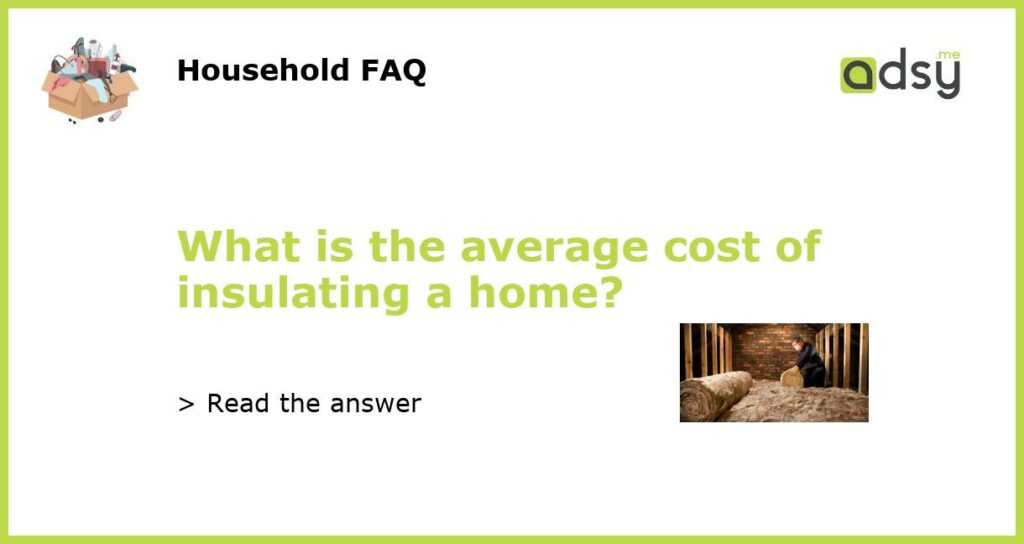Insulating a home is an important investment that can help reduce energy consumption, lower utility bills, and improve the overall comfort of a living space. However, many homeowners are unsure about the average cost of insulating their homes. The cost of insulation can vary depending on various factors such as the size of the home, the type of insulation material used, and the region in which the home is located. In this article, we will explore the average cost of insulating a home and provide insights into the different factors that can affect these costs.
1. Understanding the Importance of Home Insulation
Insulation plays a crucial role in maintaining a comfortable indoor environment by reducing heat transfer between the interior and exterior of a home. In winter, insulation helps to keep the heat in, while in summer, it prevents excessive heat from entering the home. Proper insulation can significantly improve energy efficiency, reducing the need for heating and cooling systems and consequently lowering utility bills.
2. Factors Affecting the Cost of Home Insulation
Several factors can influence the overall cost of insulating a home:
– Size of the Home: The larger the home, the more insulation material is required, which can increase the cost.
– Type of Insulation Material: There are various types of insulation materials available, including fiberglass, cellulose, spray foam, and rigid foam, each with its own cost. Fiberglass is the most commonly used insulation material, known for its affordability. Spray foam, on the other hand, is one of the most expensive options but provides superior insulation.
– Location: The cost of insulation can also vary depending on the region in which the home is located. Areas with colder climates may require higher levels of insulation, which can increase the overall cost.
– Accessibility: If the home is difficult to access, such as attics or crawl spaces, the cost of insulation may increase due to labor and equipment requirements.
– Additional Factors: Other factors that can influence the cost include the condition of the existing insulation (if any), the need for air sealing, and any special requirements or considerations specific to the home.
3. Average Cost of Insulation
The cost of insulating a home can range from a few hundred dollars to several thousand dollars, depending on the factors outlined above. On average, homeowners can expect to spend between $1,500 and $3,000 for insulation installation. However, this is just a rough estimate, and the actual cost can vary significantly based on the specific circumstances of the home.
To get a more accurate idea of the cost, it is recommended to consult with insulation contractors who can assess the home and provide a detailed estimate. They will consider the size of the home, the type of insulation material recommended for the specific needs, and any other factors that may impact the overall cost.
4. Return on Investment
Although insulating a home involves an upfront cost, it is important to consider the long-term benefits and potential return on investment. Insulation can significantly reduce energy consumption and lower utility bills, resulting in long-term savings. The initial investment in insulation can often be recovered within a few years through reduced energy expenses.
In addition to monetary savings, insulation can also improve the overall comfort of a home. By creating a more consistent temperature throughout the living space, insulation helps eliminate drafts and cold spots, providing a more comfortable environment for occupants.
5. Financing and Incentives
To encourage homeowners to invest in energy-efficient upgrades, there are various financing options and incentives available. Some utility companies offer rebates or incentives for upgrading insulation, while government programs may provide tax credits or low-interest loans. It is worth researching these opportunities to make the most of available financial assistance.
In conclusion, the average cost of insulating a home can vary depending on factors such as the size of the home, type of insulation material used, region, accessibility, and any additional requirements. On average, homeowners can expect to spend between $1,500 and $3,000 for insulation installation. However, it is recommended to consult with insulation contractors to get a more accurate estimate based on the specific needs of the home. Despite the upfront costs, investing in insulation can lead to long-term savings, improved comfort, and potential financial incentives.

